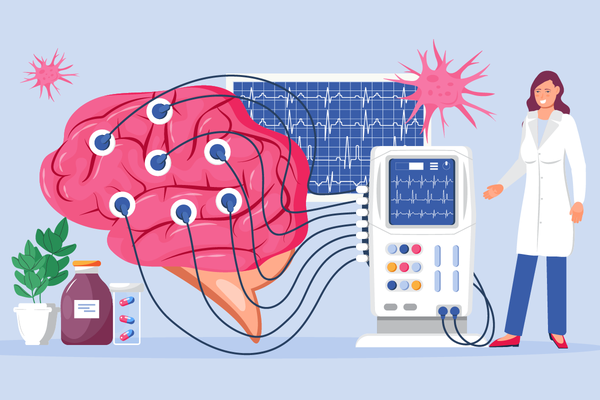Most people know multiple sclerosis (MS) as a disease that affects you physically. But many don’t know that it can also impact your memory and cognition (learning and processing).
Tara Kent, a 39-year-old mother of 12-year-old twins, was diagnosed with the disease seven years ago. She knows the emotional effect these mental issues can have on a person. “I feel like having MS has affected my identity and how I see myself,” she said. “I don’t recognize myself a lot of the time anymore. Like, who is this Tara? Normal Tara would never forget this or never do that.”
Kent’s physical MS symptoms started just a few weeks before she was diagnosed, but when she was asked when she noticed something wasn’t right with her memory or when her brain fog started, she had to check with her husband. According to him, it had been over the last three or four years that her cognitive and memory symptoms started and got worse.
Cognitive issues don’t affect everyone with MS
“Cognitive problems don’t affect everyone with MS, but they affect a large proportion of patients,” said Bardia Nourbakhsh, M.D., M.A.S., associate professor of neurology at Johns Hopkins Medicine. “Cognitive problems are associated with a lower quality of life for patients, and they can end in disability and loss of jobs. They also affect personal lives and relationships.” But, Nourbakhsh pointed out, it’s important to note that this cognitive decline is not the same as the decline associated with Alzheimer’s disease or Parkinson’s disease. Cognitive decline and memory issues related to MS are more subtle and usually less severe.
When patients with MS tell Nourbakhsh about brain fog or cognitive issues, he refers them for testing to see how far along the decline is. He also wants to know if the problems are caused by a reversible issue, like thyroid disease, vitamin B12 deficiency or a medication side effect. Once he knows the cognitive problems are related to MS, Nourbakhsh and his patients work together to come up with a treatment plan. “There is no medication that's been shown to improve cognitive functioning in people with MS,” Nourbakhsh explained. “So the focus of treatment of cognitive problems in MS is rehabilitation. We ask our rehabilitation colleagues, including occupational therapists or a speech and language pathologist, to help with those issues,” he said. While there are not yet therapies to improve cognitive functioning, there are some therapies that slow cognitive decline, and these may be used along with rehabilitation.
Cognitive rehabilitation
Michelle Mioduszewski, M.S., OTR/L, owner of Niagara Therapy, sees people with MS in her occupational therapy practice. She has found that cognitive impairment and executive dysfunction are common in these clients, she said. “[Executive function includes] things like memory for detail and facts, and organization — being able to put together large pieces of information, organize it and manipulate it in your mind.”
To help her clients manage symptoms, Mioduszewski assesses their needs. They discuss what tasks her clients do at home, at work and where they volunteer, if they do. “We sit down with the client and look globally at what has been impacted by their MS or anything else that's going on, what’s causing those challenges,” Mioduszewski said. This could be anything from muscle endurance issues or fatigue to coordination or cognitive issues. “Once we determine what particular area is challenging, we collaboratively come up with a plan.”
While Mioduszewski can’t do anything about the actual memory loss, she can help clients come up with adaptations, such as using their phone to take notes.
Discussing issues with your neurologist
Medical treatment is a team effort, but your neurologist can’t help you if you don’t share what you’re experiencing. It’s vital to be open and upfront about new or worsening symptoms and their effect on your life. But the idea of speaking with the doctor and asking the right questions can be discouraging for someone with memory problems.
“My husband is my rock and my brain for me when I can’t remember. I usually have my husband with me when I do most things, so he reminds me,” Kent said. “He either comes [to the doctor’s appointment] with me or I will make a list of questions or things I need to talk about with my doctor.”
Coping with cognitive issues, brain fog and forgetfulness
Given the impact of MS-related cognitive issues, you may need more assistance than you think. “Many times, we have to provide documentation for employers or schools for patients who struggle with these issues,” Nourbakhsh said. “Asking for accommodation is possible and available for many people.”
People with MS can also try complementary approaches like music therapy, which helps some people with remembering things and interpreting their senses. Physical exercise also helps some people improve their memory.
As for other steps, the National Multiple Sclerosis Society recommends:
- Don’t rely on just one way to learn. You may need to watch, read, hear and practice for instructions to sink in.
- Repeat and verify instructions or facts you need to remember.
- Associate names with something you already know. If you meet someone named Anthony and you went to St. Anthony High School, put them together in your mind.
- Use tools to help you remember things, like your phone, a notebook, a calendar or even a voice recorder.
- Do one thing at a time. Don’t try to multitask.
Most importantly, don’t give up. Mioduszewski recalled one client who had a mess of a checkbook. “We worked on organizational strategies and how to keep track of things,” she said. “Lo and behold, this client actually found a mistake and got money back into the account because it was a bank error. She found it because she was now so organized.”
This resource was created with support from BMS.







